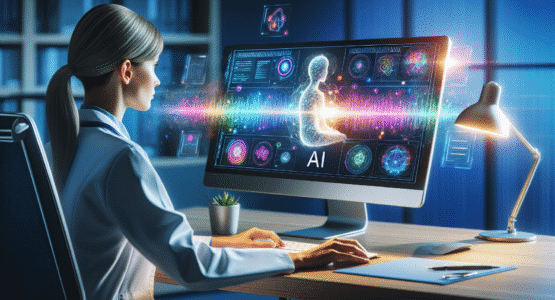Artificial intelligence (AI) is no longer a distant horizon in the healthcare sector; it’s a present reality transforming how care is delivered. In today’s healthcare landscape, AI technologies are being deployed to manage patient data, assist in diagnosis, and enhance treatment protocols, streamlining operations while optimizing outcomes.
AI’s rapid adoption is fueled by its ability to efficiently handle large datasets that contain crucial patient information. This capacity enables healthcare providers to make informed decisions quickly, thereby improving overall patient care. For instance, AI algorithms can sift through thousands of imaging records to detect anomalies that could indicate early stages of disease, an area where human oversight alone might falter due to sheer volume.
Moreover, AI is paving the way for personalized medicine. By analyzing an individual’s genetic makeup, lifestyle factors, and medical history, AI tools are developing custom treatment plans tailored to meet specific needs. This level of precision not only enhances treatment efficacy but also reduces the risk of adverse effects, ushering in a new era of patient-centric care.
While AI’s benefits are numerous, challenges remain in its widespread implementation. Ethical considerations regarding data privacy, ensuring algorithm transparency, and providing necessary training to healthcare professionals are areas that need addressing. However, as technology advances, these hurdles are gradually being overcome, laying the groundwork for even broader AI adoption.
The future of AI in healthcare is promising, with potential expansions into predictive analytics and telemedicine, further enhancing accessibility and quality of care. As AI in Healthcare continues to evolve, its role in the healthcare ecosystem becomes indispensable, promising not only better patient outcomes but also operational efficiencies.
Recent (2024–2025) Real-World Examples of AI in Healthcare
1. Google DeepMind’s AlphaMissense (2023–2024)
AlphaMissense is an AI model developed by Google DeepMind that predicts the pathogenicity of missense genetic variants. By assessing whether these mutations are likely to be disease-causing or benign, AlphaMissense supports research and clinical prioritization in the diagnosis and study of rare genetic disorders.
2. IBM Watson Health’s Rebranding as Merative (2022–2024)
IBM Watson Health was rebranded as Merative in 2022. Merative continues to deliver AI-powered solutions for clinical decision support, imaging diagnostics, and operational analytics in hospitals, helping healthcare providers improve outcomes and efficiency.
3. PathAI and Labcorp Partnership (2024)
PathAI and Labcorp have partnered to deploy AI-powered pathology tools that enhance the accuracy and speed of cancer diagnosis in Labcorp laboratories. This collaboration aims to improve patient outcomes by enabling faster and more reliable pathology assessments.
4. Aidoc’s AI Radiology Platform (2024)
Aidoc’s AI platform is used in hospitals worldwide for real-time triage of critical conditions such as brain hemorrhages and pulmonary embolisms, utilizing CT scans. The technology helps radiologists quickly identify urgent cases, improving patient care and treatment times.
5. Mayo Clinic + Google Cloud (2024)
Mayo Clinic is integrating Google Cloud’s AI tools into its radiology departments and hospital operations. These tools include AI-driven scheduling systems and advanced imaging analysis, streamlining workflows and enhancing diagnostic accuracy.
6. Tempus AI (2024)
Tempus AI, a leading precision medicine company, went public in 2024. The company uses AI to analyze genomic and clinical data, enabling the personalization of cancer treatments and supporting oncologists in selecting the most effective therapies for individual patients.
7. Nabla Copilot (2023–2024)
Nabla Copilot is an AI-powered medical documentation assistant used by physicians to automatically transcribe and summarize patient consultations. This tool reduces administrative burden, allowing clinicians to focus more on patient care.
8. Babylon Health’s AI Chatbot (2024)
Babylon Health’s AI chatbot is utilized in the UK and Rwanda for initial patient triage. It provides symptom checks and connects users to appropriate care pathways, improving access to healthcare and reducing wait times for patients.
9. Butterfly Network’s AI-Enhanced Ultrasound (2024)
Butterfly Network employs AI to guide non-specialists in capturing high-quality ultrasound images and assists with interpretation for point-of-care diagnostics. This technology expands access to diagnostic imaging in a variety of clinical settings.
10. Viz.ai Stroke Detection (2024)
Viz.ai’s AI solution is deployed across US hospitals to detect strokes from CT scans. The system instantly alerts specialists, reducing treatment times and improving outcomes for stroke patients
Conclusion
In conclusion, AI in healthcare is not just assisting healthcare providers today but is set to redefine healthcare practices and patient experiences in the future. As we continue to explore its potential, AI will play a pivotal role in creating a more efficient, personalized, and accessible healthcare system.



